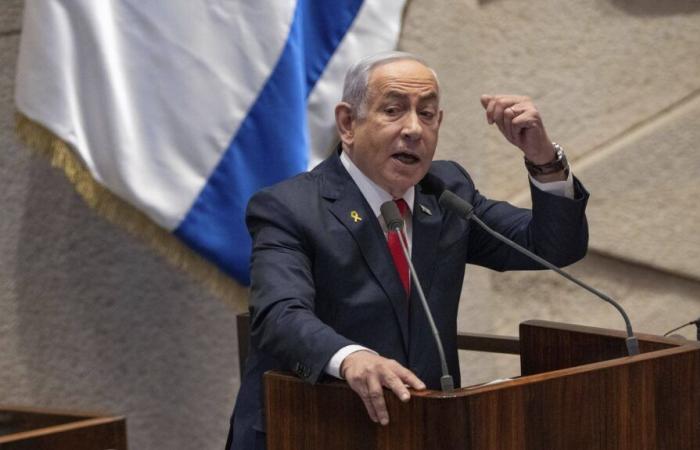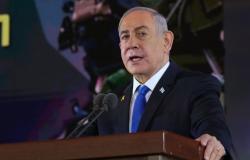
The Israeli Prime Minister is being prosecuted for “crimes against humanity and war crimes” in the Gaza Strip. The signatory states of the founding treaty of the ICC, including France, are theoretically required to arrest him if he enters their territory.
Benjamin Netanyahu will now be more isolated. The Israeli Prime Minister is the subject of an arrest warrant from the International Criminal Court (ICC), issued Thursday November 21, “for crimes against humanity and war crimes committed since at least October 8, 2023, and at least until May 20, 2024” in the Gaza Strip. The person concerned was quick to react: he denounced a decision “anti-Semitic” and compares the procedure to a new “Dreyfus trial”.
The issuance of this arrest warrant limits, in fact, his possibilities of traveling abroad, in particular in the 124 signatory States of the Rome Statute (listed on the ICC website), at the origin of the creation of this body based in The Hague (Netherlands). Article 86 of the text specifies that “state parties [signataires] cooperate fully with the Court in its investigations and prosecutions of crimes falling within its jurisdiction.
These states are therefore, in theory, required to arrest Benjamin Netanyahu if he decides to go to their territory, just like his former Minister of Defense, Yoav Gallant, also targeted. Canada is committed to this. “We will always follow the decisions and regulations of these bodies”promised his Prime Minister, Justin Trudeau, Thursday. The European Union is on the same line: arrest warrants must be “respected and applied”declared the head of European diplomacy, Josep Borrell. Italy has already indicated that it will be in “the obligation to stop” Benjamin Netanyahu. Berlin, for its part, “examine” what the issuance of these arrest warrants “means for application in Germany”.
What if Benjamin Netanyahu came to France? Neither Emmanuel Macron nor Michel Barnier reacted on Friday morning. Questioned on Thursday, the spokesperson for French diplomacy, Christophe Lemoine, seemed embarrassed: “This is a legally complex issue (…) which requires great care,” he replied during a press conference, posted online on YouTube. Before adding that “on this case, as on all others, we are following the action of the Court prosecutor who acts in complete independence. (…) Our reaction will be in line with his principles.” “France takes note of this decision”confirmed the Ministry of Foreign Affairs on Friday morning. “Faithful to its long-standing commitment to supporting international justice, it reiterates its attachment to the independent work of the Court, in accordance with the Rome Statute.”
The Israeli Prime Minister can, on the other hand, go to Hungary without fear. Prime Minister Viktor Orban, who currently holds the rotating presidency of the Council of the EU, “invites” to come whenever he wants. Way, he says, of “challenge” the ICC decision.
Benjamin Netanyahu is also welcome on American soil. The United States, allies of the Jewish state, have not ratified the Rome Statute. “Whatever the ICC may imply, there is no equivalence, none, between Israel and Hamas,” commented Joe Biden, who judges “scandalous” arrest warrants from the International Criminal Court. Donald Trump, who will succeed him in January at the White House, has never hidden that he would oppose the prosecution of international jurisdiction against Israeli officials. The Jewish state, moreover, has not ratified the Rome statute either: the country is therefore not required to cooperate with the Court by arresting its own Prime Minister.
The obstacle is also material. The ICC, which does not have its own police force, cannot make an arrest itself. Execution of mandates “depends on international cooperation”confirmed its president, Piotr Hofmanski, in 2023. If the authorities of the States parties to the Rome Statute do not act, whether in collecting evidence or in handing over suspected persons, the court can therefore do nothing and its decisions remain a dead letter.
The ICC itself recognizes “many difficulties”. “The Court does not have its own execution mechanism and it is not uncommon for States to not respond to requests for the execution of arrest warrants”can we read in one of its reports (PDF file). At the beginning of September, Mongolia, although a signatory to the Rome statute, left Vladimir Putin completely free to move around. The Russian president is also the subject of an arrest warrant for the war crime of “illegal deportation” of Ukrainian children. Already in 2015, South Africa refused to handcuff former Sudanese President Omar al-Bashir, then prosecuted for “genocide”.
Neither Mongolia nor South Africa have been sanctioned for these breaches of their commitments. “If a State Party does not comply with a request for cooperation from the Court contrary to what is provided for in this Statute, and thus prevents it from exercising the functions and powers conferred upon it by this Statute, the Court may take note and refer to the Assembly of States Parties or the Security Council [des Nations unies] when it was he who seized it”we can read in the text of the Rome Statute (PDF file)on page 85.
Benyamin Netanyahu's last trip abroad dates back to the end of September, to New York, for the United Nations General Assembly. Contacted by franceinfo, the International Criminal Court recalls that an arrest warrant does not have“no time limit”.





